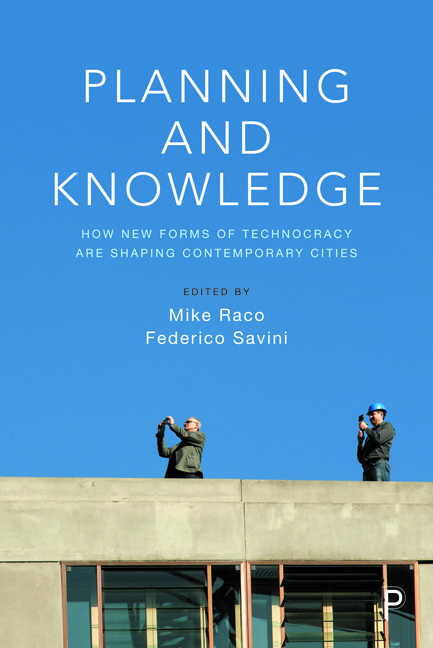Book contents
- Frontmatter
- Contents
- List of figures
- List of tables
- Notes on contributors
- Part I Conceptual framings of technocracy
- Part II Public planning and bureaucracies in contemporary urban development politics
- Part III Corporate knowledge and the land and property development sector
- Part IV Private consultants and the delivery of public policy
- Part V New constellations of actors and the management and governance of contemporary cities
- References
- Index
17 - Transnational design and local implications forplanning: project flights and landings
Published online by Cambridge University Press: 30 April 2022
- Frontmatter
- Contents
- List of figures
- List of tables
- Notes on contributors
- Part I Conceptual framings of technocracy
- Part II Public planning and bureaucracies in contemporary urban development politics
- Part III Corporate knowledge and the land and property development sector
- Part IV Private consultants and the delivery of public policy
- Part V New constellations of actors and the management and governance of contemporary cities
- References
- Index
Summary
Introduction: technocracy, planning and iconicdesign
The relationship between planning knowledge and policyaction in the public domain may radically varyaccording to the paradigm one refers to (Friedmann,1987). Technical and scientific knowledge can beseen as the main (in extreme cases, the only) sourcefor public decision-making, or, on the contrary, as(an eventual) confirmation of the orientationsemerging from society. In all possibleinterpretations, this tension between technicalreason and democratic self-governance cannot beunderestimated. To cut a never-ending theoreticaldebate short, the conception of societalorganisation and the ways in which public action iscarried out is crucial in framing this tension. Forexample, in neoclassical liberal views ofdevelopment, knowledge is diffused and due to itscomplexity cannot be controlled by technical expertsalone or masterminds. Limited regulation is expectedto enhance spontaneously emergent orders and to workbetter than planning (Moroni, 2007). In theseliberal perspectives, technocracy has little spacein theory, but perhaps it manifests itself quiteextensively in the contemporary planning practicesof so-called liberal countries. On the contrary,substantial power in decision-making and centralisedcontrol over implementation may imply that rulersand technical experts decide on the basis of whatthey, alone, are supposed to know. But, in reality,plans and projects are adjusted during theimplementation process, according to multiple viewsand non-technical knowledge.
This chapter reflects on today's logics of technicalknowledge production, replication and transmissionquestioning the operating of international designfirms in autocratic countries. It does so in orderto argue that today the technocratic logics ofpolicy making have a global profile, because theyprosper and diffuse through the transfer oftechnical expertise across political and culturalcontexts. If one looks at planning cultures (Sanyal,2005), rational choice and the hope in all-seeingand science-based decisions were and still arerelevant, both in western countries and, especially,in countries that are undergoing strongindustrialisation or modernisation pushes. Ofcourse, these are general conceptions andorientations, but we now know, at least withreference to urban planning and design, that localprocesses of development are more complicated inpractice than in theory (Palermo and Ponzini,2015).
- Type
- Chapter
- Information
- Planning and KnowledgeHow New Forms of Technocracy Are Shaping Contemporary Cities, pp. 225 - 240Publisher: Bristol University PressPrint publication year: 2019



